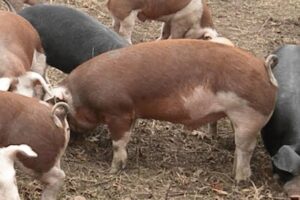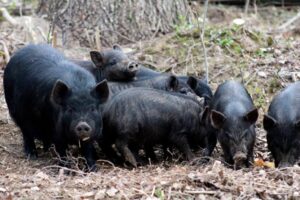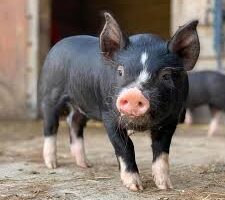Large Black pigs, often referred to simply as “Large Blacks,” are a heritage breed known for their excellent foraging abilities, docile temperament, and adaptability to outdoor and pasture-based farming. Their unique characteristics make them a favorite among small-scale farmers and homesteaders who are focused on sustainable and humane pig farming practices.
Read about Berkshire pigs
In this article, we’ll delve into the history, characteristics, and benefits of raising Large Black pigs, while also offering tips for successfully incorporating this breed into your farm.
History of Large Black Pigs
The Large Black pig breed originated in England during the 16th century, primarily in the counties of Devon and Cornwall. As their name suggests, these pigs are notable for their all-black color and large size. They were initially bred for their excellent grazing and foraging abilities, making them an ideal breed for small farms where pigs could roam freely and feed on pasture.
By the 20th century, the breed was popular not only in the United Kingdom but also in other parts of the world, including the United States. However, with the rise of commercial pig farming, where breeds designed for confinement and rapid growth became more popular, the Large Black pig population declined. Today, thanks to renewed interest in heritage breeds and sustainable farming, Large Blacks are experiencing a resurgence.
Physical Characteristics of Large Black Pigs
Large Black pigs have several distinctive physical traits that set them apart from other breeds:
Color: As their name indicates, they are entirely black, which gives them added protection against sunburn compared to lighter-skinned breeds.
Size: These pigs are large, with boars typically weighing between 600 and 800 pounds, and sows between 500 and 700 pounds.
Ears: One of their most unique features is their large, floppy ears, which extend over their eyes. These ears provide protection from sunlight but can sometimes affect their visibility.
Body Shape: Large Blacks have a long, deep body with a strong, muscular frame, making them ideal for meat production.
Key Benefits of Raising Large Black Pigs
Large Black pigs offer several advantages that make them an excellent choice for farmers looking to raise pigs in a sustainable, pasture-based environment.
- Superior Foraging Ability
Large Black pigs are known for their exceptional foraging skills. They thrive in pasture-based systems, where they can graze on grass, roots, and other natural forage. This reduces the need for commercial feed, making them more economical to raise in outdoor environments. Their ability to efficiently convert pasture into body mass is one of the reasons they’re highly regarded among sustainable farmers.
- High-Quality Pork
Large Black pigs produce flavorful, marbled meat, which is prized for its tenderness and juiciness. The breed’s pork is often compared to high-end cuts of beef, thanks to its rich flavor and high fat content. This makes Large Black pork highly desirable in gourmet markets and among consumers who are willing to pay a premium for heritage-breed pork.
The slow growth rate of the breed, while less favorable for industrial farming, results in better-developed muscles and higher meat quality.
- Docile Temperament
One of the standout traits of Large Black pigs is their calm and docile temperament. They are easy to manage, even for beginner farmers. Their gentle nature makes them less prone to aggression, which is particularly helpful when raising them in mixed-farming environments or near other livestock.
- Adaptability to Outdoor Farming
Large Black pigs are well-suited for outdoor and pasture-based systems. They are hardy animals that can adapt to a range of weather conditions, including cold climates, thanks to their thick, dark skin that provides protection against the elements. Their large size and slow, steady growth make them a breed that thrives in extensive farming setups rather than confinement systems.
- Excellent Mothering Abilities
Large Black sows are known for their strong maternal instincts and ability to produce large, healthy litters. They are attentive mothers and often require less intervention during farrowing (the process of giving birth). The combination of high fertility rates and good mothering abilities makes them an ideal breed for farmers who want to expand their herd efficiently.
Challenges of Raising Large Black Pigs
While Large Black pigs offer numerous benefits, there are a few challenges to consider:
- Slower Growth Rate
Large Black pigs grow more slowly than commercial breeds, taking longer to reach market weight. While this slower growth rate results in better meat quality, it may be less desirable for farmers focused on rapid production and turnaround. Patience is key when raising Large Blacks, as they take longer to mature than fast-growing commercial breeds.
- Feed Costs
Although Large Black pigs are excellent foragers, their large size and slower growth mean they may require supplemental feed, especially in environments where pasture is not available year-round. This can increase feed costs if pasture conditions are poor or limited.
- Visibility Issues
Due to their large, droopy ears that cover their eyes, Large Black pigs may have limited vision, particularly in new environments. This can lead to challenges in managing them, especially in unfamiliar settings. However, their strong sense of smell and calm demeanor typically compensate for their limited eyesight.
Tips for Raising Large Black Pigs
To ensure success with Large Black pigs, follow these tips for optimal care and management:
- Provide Plenty of Pasture
Since Large Blacks are excellent foragers, providing them with ample pasture is crucial. Rotational grazing systems work well with this breed, allowing them to graze on fresh forage while preventing overgrazing in any one area. This practice not only supports the pigs’ health but also contributes to soil regeneration.
- Supplement Feed When Necessary
While Large Black pigs can thrive on pasture, you may need to provide supplemental feed, especially during the winter or when pasture quality is low. A balanced diet rich in protein and nutrients will help support their growth and maintain the quality of their meat.
- Monitor Health Regularly
Like all pigs, Large Blacks are susceptible to certain health issues, including parasites and respiratory diseases. Regular veterinary check-ups, vaccinations, and deworming are essential to keeping your herd healthy. Ensure that their housing is clean, dry, and well-ventilated to reduce the risk of disease.
- Provide Adequate Shelter
While Large Black pigs are hardy and adaptable to outdoor conditions, they still require shelter from extreme weather. Make sure your pigs have access to shade in the summer and dry, warm shelter in the winter. Providing a wallow (a mud pit) during hot weather can help keep them cool and prevent heat stress.
Conclusion
Large Black pigs are an excellent choice for farmers looking to raise pigs in a pasture-based, sustainable system. Their superior foraging abilities, high-quality meat, and docile temperament make them ideal for both small-scale homesteaders and larger farming operations. While they may grow more slowly than some commercial breeds, the payoff in terms of meat quality and sustainability is well worth the wait.
By following best practices in care, feeding, and health management, you can raise healthy Large Black pigs that will thrive in outdoor environments and contribute to a successful farming operation. Whether you’re raising pigs for personal consumption or selling premium pork, Large Black pigs are a breed that delivers both quality and sustainability.







1 Comment
Comments are closed.